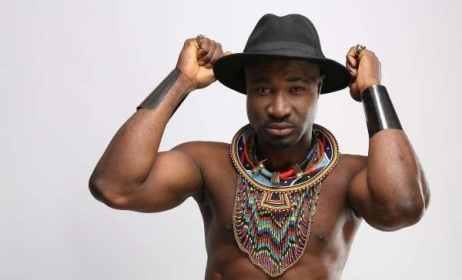The new pornography: On sex and Nigerian music
I embraced Iyanya only recently.
 Cynthia Morgan and Iyanya belong to the "huge horny-dom" that is today's generation of Nigerian popstars
Cynthia Morgan and Iyanya belong to the "huge horny-dom" that is today's generation of Nigerian popstars
Intervening factor was that I saw a waste disposal truck in Lagos, on whose body was written the company slogan: "Your waste! Your waste! All I want is your waste!" Iyanya, who is obsessed with both his own body and the female's, was proven capable of productive inspiration.
A creative appropriation, it wiped off my contempt for the Iyanya brand and I watched his videos again. He is a good dancer, by the way.
But Iyanya is not even remotely the face of musical pornography in the Nigerian pop music industry. Today's generation of Nigerian artists are one huge horny-dom incapable of sexless creativity.
Lust is the new alternative to substance. We have allowed sex to preside over our minds, and have chosen a mindless carnality over cerebral stimulation.
The music is good, no doubt—in fact, we are spoilt for choice in the sheer volume of fine new acts and music products. There is breathtaking productivity in the entertainment industry and we should be proud. A little spoiler: most of the trending songs are powered by the same beats.
You could prise out Mr A's lyrics and lay them on Mr B's beats and no one would notice the mischief. Cases of recycled lyrics also abound. We do not easily notice because good pop music often generates physical response more than it does mental screening. Yet we would be a mad lot to dance without pausing, without thinking about the message for once.
One can understand: youth is lustful. Society tolerates that the energy of youth often finds sexual application. But the indulgence has a consequence: the Nigerian society has come to see youth as unserious, like it cannot elevate itself to higher engagement. That explains why the Nigerian government, on the few occasions it hires young people, often assigns them to a portfolio like Social Media. Not even in the ministry of youth and sports do you have young people heading offices. Youth has been so infantilised with the evident approval of youth.
True, pop music is the forte of the young—and being young should not excuse the lack of higher thought. 2Pac died world-famous at 25. His fame stood mostly on Black activism than on anything else. To be fair, the Nigerian music industry has had its own political era focussing on government corruption and tardiness. The market became bored of the message and sex, that unfailing escapism, became the new excitation.
Never mind our moral pretensions, sex has proven itself more effective than the government at keeping people sane. For a people already too populous by the very act, musical pornography becomes both arousal and celebration of libido.
Not that sex is a bad thing. Only that the theme has been mined to pure chaff. Rather than change the theme or at least improve on it, our artistes change only the language of depravity: from 'banana', they now talk of 'cassava'. The erection is bigger and harder. Love themes? With the exception of a few genuine love songs, the rest are lust songs masquerading as romance, lacking both the emotional credibility and the passion of affection. In the videos, 'love' platitudes fall flat from the lips of mostly young male singers invigilating the twerks of female dancers. They're not complaining, these women.
Or perhaps they are. "They want the girls with the biggest behind," sings Cynthia Morgan, either in lamentation or approval. "The girl with the German juice," she adds, shrouding lewdness in mysterious wording: the words do not assist the search for meaning, but a clever one will find that the vagina has, yet again, earned another proud synonym.
Such opacity matters, but not to Tiwa Savage who, in the video for 'Wanted', was neither clothed nor totally naked. Her stage performances achieve electricity by her raunch, rather than by her music. "O boy you say you go light my fire...but if I catch you, na you go tire!", she assures, in 'Jantamanta'. Her sophomore album mentions a local aphrodisiac. Even the prim-and-proper Asa is currently rebranding to a new sexiness; she has recorded a song about sex with Darey. Sex is winning.
And there you go again with that argument: that our artistes have to sing what the market wants. You call it "going commercial" for the money. Boring. We need artists powerful enough to sway the market, powerful enough to set the agenda and get us to follow. Icons who can excite our minds as they do our bodies.
If what we mostly dance to in music is the beat, can't we have the fabulous beat with an enriching message? Isn't youth supposed to demonstrate at least some promise in leadership? Pop is a movement as much as it is entertainment.
There is the occasional digression to beef songs and claims of glossy ownerships—the Phantoms, Lamborghinis, Bugattis, etc. Latest is the budding annexation of pentecostal prosperity credo to pop music. "Fada Fada!," sings Phyno, months after the success of Korede Bello's 'Godwin'. Both songs are played in church celebrations today, plucking new markets for the artistes. The 'Connect' singer thanks God for his success; Korede celebrates Him for bank alerts, among other things—and everyone is so happy they do not care if it's a debit alert. Away with the sex and female body fixation for once, even if with a theme not so engaging.
One hopes that Phyno's new gospel appeal marks a new leaf from sexual rapping. "I no be one-minute man I'm not coming quicker!" he boasts on 'Karishika' by Falz. Priding himself as "Eze Nnunnu," which translates to something like Cassanova, Phyno hops from track to track on his manhood. "A bu m Moses mmiri gi ka m na-abia i divide". Here in 'Ezege', he's coming to 'divide' her water, like Moses did, after bluffing that she would, in due time, part the closed legs.
Music is not necessarily moral. But it at least reflects the socio-cultural status of a people at a given period: their politics, art, values, problems, and triumphs. In the music products of the 1960s, we see the political focus. In the next two decades, Nigeria will be over 250 million people. Listening to our current music offerings, our children will be eavesdropping on the sexual conversations leading to the huge population.
So what exactly does our music reflect about us—and what are we even celebrating as a people still stuck in 18th century living? Two things: life and the hope of a better future. We celebrate life, celebrate our little individual successes in spite of a difficult nation—that is to say, our music is consolation as celebration. And that is good. In the other person's success, one finds inspiration and material for persistence.
On its own this is a great theme and we can go from there to singing about the larger concerns of our times. Our creative energies can be inspired by things more elevated. But no one has told Nigerian pop artists.



































Comments
Log in or register to post comments